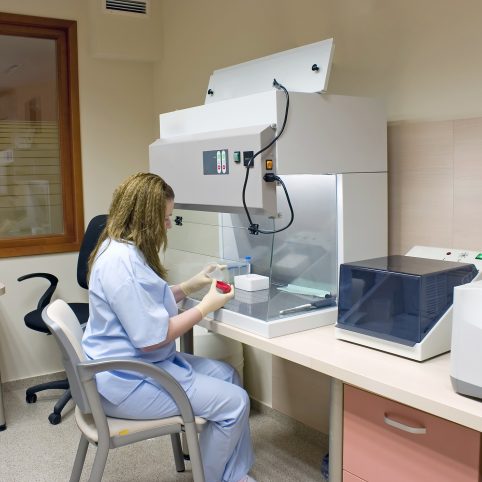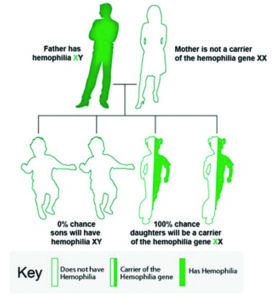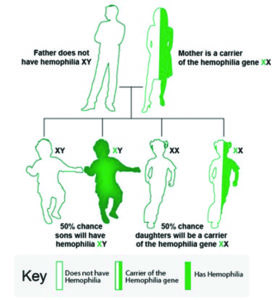Inherited bleeding disorders such as haemophilia can have an impact on daily life and psychological wellbeing not only of the affected individual but also on carrier mothers and other close family members. Before embarking on parenthood, known carriers or those who have the possibility of carrying haemophilia should be given the opportunity to consider the implications for their children and themselves.
Carrier testing in haemophilia is dependent on the accurate taking of family history and confirmation of family relationships. A woman can be defined as an obligate (definite) carrier of haemophilia if; her father has haemophilia or she has two children with haemophilia or she has a child/grandchild with haemophilia and a maternal relative with haemophilia. It is important to remember that in 30% of women who are carriers of haemophilia, there is no family history of the disorder and it has occurred in the family as a result of a spontaneous mutation.
The genetic abnormality (mutation) that causes haemophilia occurs on the X chromosome which is passed from parents to their children. The inheritance pattern of haemophilia if the man has haemophilia is illustrated in figure 1. In general, all the daughters of a man with haemophilia will be carriers and none of the sons will be affected. The inheritance pattern of haemophilia if the woman is a carrier of haemophilia is illustrated in figure 2. In general, there is a 50% chance that any daughter will be a carrier and a 50% chance that any son will have haemophilia.
Genetic testing can be done to determine carrier status. These tests are complex. However, results are more reliable if DNA from a family member with haemophilia is also available.
In Ireland, the policy is that a possible carrier must be old enough to understand the implications of the test results before genetic testing is carried out. This is usually after 16 years of age. The sooner a girl is tested after this age, the more time she has to come to terms with being a carrier. It also prepares her for eventual decisions about pregnancy and childbirth.
People cope in different ways when they are faced with new information. This depends on age, reasons for seeking the test and on any previous experience they might have with the condition. Carriers can receive this diagnosis at a young age due to health problems, or as adults after the birth of a child with haemophilia in the family. A girl or woman can experience a wide range of emotions when she finds out that she’s a carrier. She may be afraid of what it will mean for her, her relationships and any children she may have. She may feel a sense of loss that she is different from everyone else and may even fall into a pattern of denial and refuse to acknowledge the diagnosis. When a son is diagnosed
with haemophilia and there is no family history, parents also have to deal with the possibility that his sisters are carriers. A person’s decision to progress with carrier testing can affect the extended family. Genetic counsellors can provide suggestions on how to inform other at-risk female relatives such as sisters, daughters or nieces.
For more information, please contact
The National Centre for Hereditary Coagulation Disorders (NCHCD) at St. James’s Hospital on 01 4162141 / 01 4162142 or Cork University Hospital on 021 4922278 for advice and an appointment.
F.A.Q.
HOW IS CARRIER TESTING CARRIED OUT?
The method that is used at present to determine carrier status is direct mutational analysis. A blood sample is first required from an affected male in the family and from the female requesting testing. There are many different genetic mutations that result in haemophilia and the most common of these are carried out first. The identification of more unusual mutations might be time-consuming and could take up to two years for results to be available.
WHAT DOES IT INVOLVE FOR ME IF I WANT TO BE CARRIER TESTED?
An affected male in the family needs to attend with you in the clinic or at an earlier date to give a blood sample. You will have an opportunity to discuss the genetic inheritance of haemophilia and the consequences of being a carrier with haemophilia with one of the specialist nurses. You will be asked to sign a consent form and a blood sample will be taken. You will be contacted when the results of your carrier testing are available and asked to attend to discuss these results and to give a confirmation sample of blood.
IF I AM A CARRIER OF HAEMOPHILIA WITH A LOW FACTOR LEVEL, CAN I BLEED?
Females who are carriers of FVIII or FIX deficiency may have reduced levels. Approximately 10% of carriers will have a level below 30% (normal is 50 – 150%). Carriers with reduced FVIII or FIX levels are managed in the same way as men with mild haemophilia. They will have a bleeding tendency which will be problematic at times of surgery, childbirth, dental work or after an accident or fall.
IF A GIRL HAS A NORMAL FACTOR LEVEL DOES THIS MEAN THAT SHE IS NOT A CARRIER?
No. It is very important to note that most carriers of haemophilia will have a normal factor level.
I AM A CARRIER OF HAEMOPHILIA AND HAVE ONE CHILD WHO HAS HAEMOPHILIA. DOES THIS MEAN THAT THE NEXT CHILD WILL NOT HAVE HAEMOPHILIA?
No. The risk of having a child with haemophilia is the same for every pregnancy.


